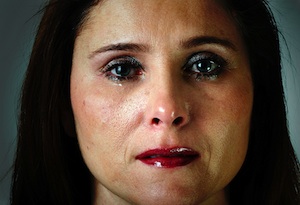How to recognise signs of depression in a friend or relative
We have a guide to 'symptoms of' depression and 'signs of' depression, you may wonder what is the difference? Well in this the 'signs of' depression guide we look at what you may recognise in a friend or relative with depression, this is quite different from the 'symptoms' they may suffer. You can find our symptoms of depression guide here.
'symptoms' they may suffer. You can find our symptoms of depression guide here.
If you notice a change in the mood or behaviour of a friend or family member, you may wonder if he or she could be depressed. Here are some of the signs.
You may notice that your friend:
- always appears to be sad or anxious
- shows a loss of self-confidence and self-esteem
- appears restless and agitated
- is unable to enjoy things that are usually pleasurable
- has difficulty concentrating, remembering details or making decisions
- feels guilty, worthless and/or helplessness
- admits to sleeping problems – insomnia, waking up much earlier than usual, or sleeping too much
- avoids other people, sometimes even close friends and family
- finds it hard to function at work/college/school
- either overeats or has lost their appetite
- has persistent aches or pains, headaches, cramps or digestive problems
- has thoughts about suicide and death.
(Symptoms list from the National Institute of Mental Health)
Signs of depression in teenagers and young people
In young people and teenagers, depression may be displayed as feelings of hopelessness or irritation with people and situations. Teenagers are more likely to display symptoms of depression as irritability or anger at the world and those around them. Signs of depression may include moodiness, hostility, frustration or angry outbursts. (Some teens and young people, though, will be more clingy and dependent – the symptoms will vary from person to person, also depending on age and personal situation.) The risk is that these outward signs of depression will be overlooked or taken as part of temperamental teenage behaviour – rather than something more serious.
Depressed teens may be extremely sensitive to criticism, as they can be already experiencing feelings of worthlessness and low self-esteem. Teenagers may also show physical signs of depression, such as unexplained aches and pains, headaches or stomach pains. The majority of young people and teenagers suffering depression will lose interest in academic work and show a decline in grades.
Some young people dwell on and talk about death – this can be expected in those grieving the death of someone close, but can be a warning sign in the case of those not experiencing a loss.
Signs of depression in the elderly
You may notice cognitive signs of depression in an elderly friend or relative, such as forgetfulness or confusion. The elderly may also display more physical signs of depression, such as fatigue or chronic pain and feeling generally anxious. You may observe other signs of depression in the elderly, such as:
- unexplained or worsening aches and pains
- demanding behaviour
- memory difficulties
- a lack of interest in personal hygiene
- missing meals
- not taking medications.
The elderly who suffer depression are less likely to seek treatment or help than younger people and are at particular risk of suicide.
Further help on depression
We hope you have found this information useful, please also see:





